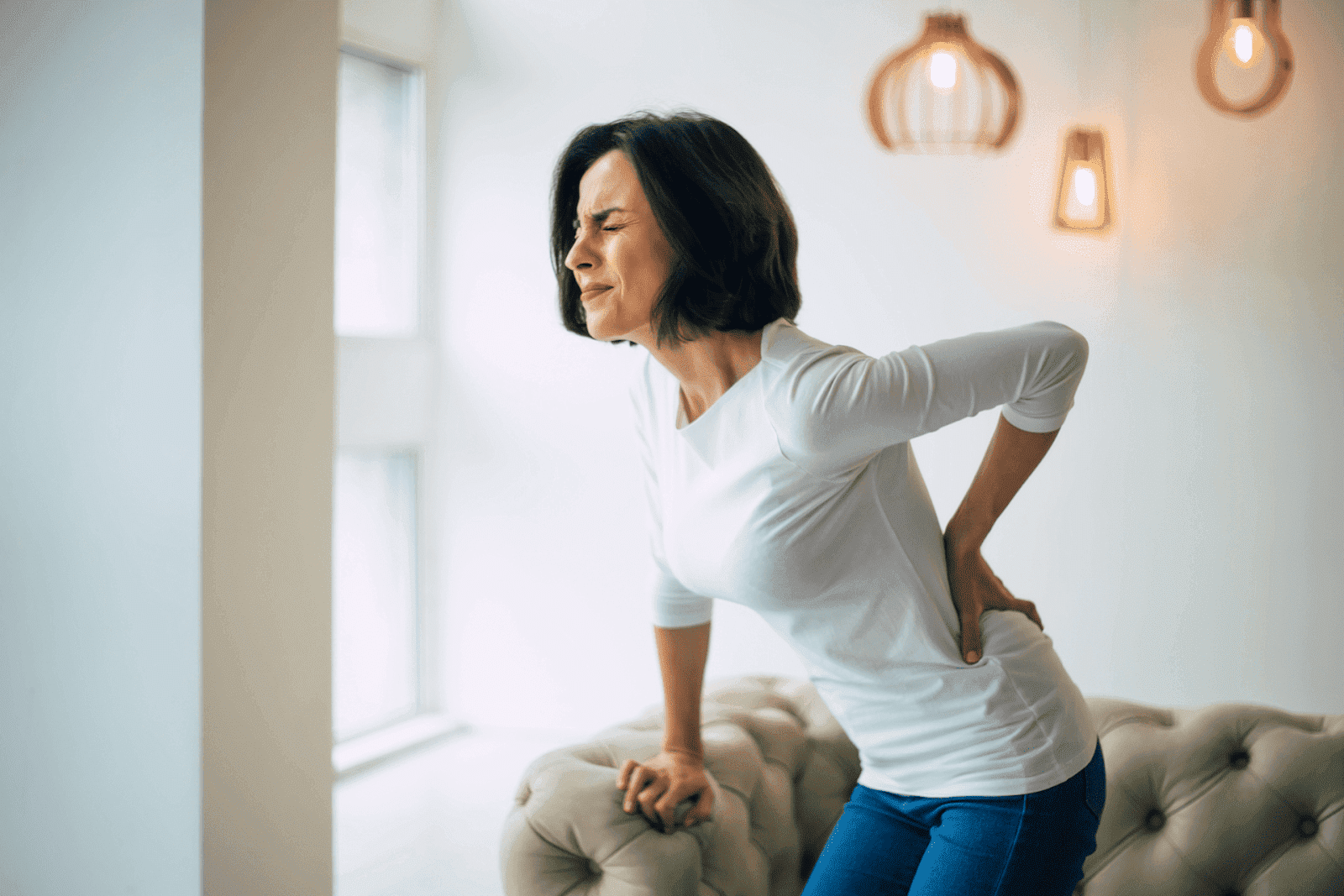Lower back pain is a common complaint that affects millions of people worldwide. While it is often attributed to muscle strain or spinal issues, one lesser-known cause is constipation. When stool builds up in the colon, it can put pressure on the lower back, leading to discomfort or pain. Understanding the connection between constipation and lower back pain is essential for effective relief and prevention.
This article explores practical strategies to ease lower back pain caused by constipation, including lifestyle changes, home remedies, and when to seek professional help. For those looking for quick, reliable medical advice, telehealth services like Doctronic.ai offer an innovative way to consult with healthcare professionals from the comfort of home.
Understanding the Link Between Constipation and Lower Back Pain
Constipation occurs when bowel movements become infrequent or difficult to pass, often due to a low-fiber diet, dehydration, or lack of physical activity. When stool accumulates in the colon, it can cause the abdomen to distend and exert pressure on surrounding nerves and muscles, including those in the lower back.
This pressure may trigger pain signals or muscle tension in the lumbar region. Additionally, straining during bowel movements can further aggravate lower back muscles and ligaments, intensifying discomfort. Recognizing constipation as a potential cause of back pain is crucial because treating the root issue can provide significant relief.
 Why Addressing Constipation Matters for Back Health
Why Addressing Constipation Matters for Back Health
Ignoring constipation-related back pain can lead to chronic discomfort and impact daily activities. Persistent constipation may also cause complications such as hemorrhoids or anal fissures, which add to pain and distress. By addressing constipation promptly, individuals can reduce lower back pain and improve overall digestive and musculoskeletal health.
Moreover, the relationship between constipation and lower back pain underscores the importance of a holistic approach to health. Incorporating dietary changes, such as increasing fiber intake through fruits, vegetables, and whole grains, can promote regular bowel movements and alleviate pressure on the back. Staying hydrated is equally vital, as water helps soften stool and makes it easier to pass. Regular physical activity not only aids digestion but also strengthens the core muscles that support the spine, further reducing the likelihood of back pain.
Additionally, stress management plays a significant role in both constipation and back pain. High levels of stress can disrupt normal digestive function and lead to muscle tension, particularly in the back. Techniques such as yoga, meditation, or deep-breathing exercises can help alleviate stress and promote relaxation in both the mind and body. By adopting a comprehensive strategy that addresses both constipation and its related symptoms, individuals can foster a healthier lifestyle that enhances their overall well-being.
Effective Home Remedies to Relieve Lower Back Pain from Constipation
Many people find relief through simple, natural methods that improve bowel function and reduce back strain. Below are some effective approaches to try at home.
1. Increase Dietary Fiber Intake
Fiber helps soften stool and promotes regular bowel movements. Incorporate a variety of fiber-rich foods such as fruits, vegetables, whole grains, nuts, and seeds into your diet. Aim for at least 25 to 30 grams of fiber daily. Gradually increasing fiber intake can prevent bloating and gas, which might otherwise worsen back pain. Foods like chia seeds, flaxseeds, and legumes are excellent sources of soluble fiber, which can help maintain a healthy digestive tract. Additionally, consider adding a daily serving of fermented foods, such as yogurt or kefir, to support gut health and improve overall digestion.
2. Stay Hydrated
Drinking enough water is essential for preventing constipation. Fluids help fiber do its job by keeping stool soft and easy to pass. Adults should aim for about 8 cups (64 ounces) of water daily, adjusting for activity level and climate. Avoid excessive caffeine or alcohol, which can dehydrate the body. Infusing water with fruits like lemon, cucumber, or berries can make hydration more enjoyable and encourage increased fluid intake. Herbal teas, such as peppermint or ginger, can also aid digestion and provide a soothing effect on the stomach, further supporting bowel regularity.
3. Engage in Regular Physical Activity
Exercise stimulates intestinal contractions, facilitating bowel movements and reducing constipation. Activities like walking, swimming, or yoga can also strengthen back muscles and improve posture, alleviating pain. Even light movement throughout the day can make a difference. Consider incorporating specific stretches that target the lower back and abdomen, as these can enhance flexibility and relieve tension. Additionally, activities like Pilates focus on core strength, which can provide better support for the spine and help prevent discomfort associated with prolonged sitting or poor posture.
4. Practice Proper Bathroom Habits
Responding promptly to the urge to have a bowel movement helps prevent stool buildup. Consider using a footstool to elevate your feet while sitting on the toilet, which can align the colon for easier passage. Avoid straining, as this increases pressure on the lower back. Establishing a routine, such as visiting the bathroom at the same time each day, can help train your body for regularity. Creating a calm atmosphere in the bathroom, perhaps with soft lighting or relaxing music, can also reduce stress and make the experience more comfortable.
5. Use Heat Therapy for Back Pain
Applying a warm compress or heating pad to the lower back can relax tense muscles and reduce pain. Heat therapy is a safe, non-invasive method to complement constipation relief efforts. For added benefit, consider alternating heat therapy with cold packs to reduce inflammation and numb sharp pain. Additionally, taking a warm bath with Epsom salts can provide a dual benefit of soothing sore muscles while also promoting relaxation, which can be particularly helpful if stress is contributing to both back pain and constipation. Aromatherapy with essential oils like lavender or eucalyptus during your bath can further enhance relaxation and well-being.
When to Seek Medical Advice for Constipation and Lower Back Pain
While home remedies are effective for many, some situations require professional evaluation. Persistent or severe lower back pain accompanied by constipation may indicate underlying conditions such as spinal issues, infections, or gastrointestinal disorders.
If you experience any of the following, consult a healthcare provider promptly:
Severe or worsening back pain
Blood in stool or black, tarry stools
Unexplained weight loss
Fever or chills
Loss of bladder or bowel control
Constipation lasting more than two weeks despite home treatment
For accessible, affordable, and expert medical advice, consider using telehealth services like Doctronic.ai. Doctronic is a leading AI-powered telehealth platform that offers free AI doctor visits and affordable video consultations with licensed physicians across all 50 states. This service can provide quick assessments, treatment recommendations, and second opinions without the need to visit a clinic in person.
 Benefits of Using Telehealth for Back Pain and Constipation
Benefits of Using Telehealth for Back Pain and Constipation
Telehealth platforms like Doctronic.ai combine the latest in AI and modern medicine to deliver personalized care. Patients can receive comprehensive answers to their health questions in seconds, backed by peer-reviewed medical research. The AI remembers patient history for more tailored advice, while video visits with licensed doctors offer convenient follow-up care.
Such services are especially valuable for those with mobility issues, busy schedules, or limited access to traditional healthcare facilities. Telehealth can help identify when urgent care or specialist referral is necessary, ensuring timely and appropriate treatment.
Additional Tips to Prevent Constipation and Protect Your Back
Prevention is key to avoiding the discomfort of constipation-related lower back pain. Incorporating the following habits into your routine can support digestive health and spinal comfort over the long term.
Maintain a Balanced Diet
Regularly consuming a variety of nutrient-dense foods supports gut health and muscle function. Probiotic-rich foods like yogurt and fermented vegetables may also promote a healthy intestinal microbiome, aiding digestion.
Manage Stress
Stress can negatively affect digestion and muscle tension. Techniques such as deep breathing, meditation, or gentle stretching can help reduce stress-related constipation and back pain.
Monitor Medication Side Effects
Some medications, including certain pain relievers and antidepressants, can cause constipation. If you suspect your medication contributes to bowel issues, discuss alternatives or adjunct treatments with your healthcare provider.
Maintain Good Posture
Poor posture can strain the lower back and exacerbate pain. Use ergonomically designed chairs and practice mindful sitting and standing habits to reduce stress on your spine.
Understanding the Constipation-Back Pain Link
Lower back pain caused by constipation is a manageable condition when addressed with the right strategies. Increasing fiber and fluid intake, staying active, and practicing healthy bathroom habits can provide significant relief. Heat therapy and stress management further support recovery and comfort.
However, persistent or severe symptoms warrant professional evaluation. Telehealth services like Doctronic.ai offer an accessible, modern solution for obtaining expert medical advice quickly and affordably. With AI-driven insights and licensed physician support, Doctronic is revolutionizing how patients receive primary care, making it easier than ever to manage health concerns from home.
By understanding the connection between constipation and lower back pain and taking proactive steps, individuals can improve their quality of life and maintain both digestive and musculoskeletal health.
Experience the Future of Personalized Healthcare with Doctronic
If you're seeking immediate relief from lower back pain due to constipation, Doctronic is here to help. As the #1 AI Doctor, we provide free AI doctor visits that offer you personalized, AI-driven medical advice in seconds. Our platform is designed to remember your health history for the most tailored care experience. For added convenience, our telehealth video visits connect you with our doctors 24/7, across all 50 states, at an affordable rate. Join over 10 million satisfied users and take the first step towards a pain-free life. Skip the line. Talk to an AI Doctor Now, for free.



 Why Addressing Constipation Matters for Back Health
Why Addressing Constipation Matters for Back Health Benefits of Using Telehealth for Back Pain and Constipation
Benefits of Using Telehealth for Back Pain and Constipation